Jun 18, 2025 – Day 1 of JTS Workshop in Trongsa, Bhutan
Hello. Starting today, Sunim will conduct a two-day workshop on “sustainable development” with representatives from five gewogs and chiwogs in Trongsa, Bhutan, along with government officials. Today, the first day, featured Sunim’s lecture, case study presentations of pilot projects, and group discussions.
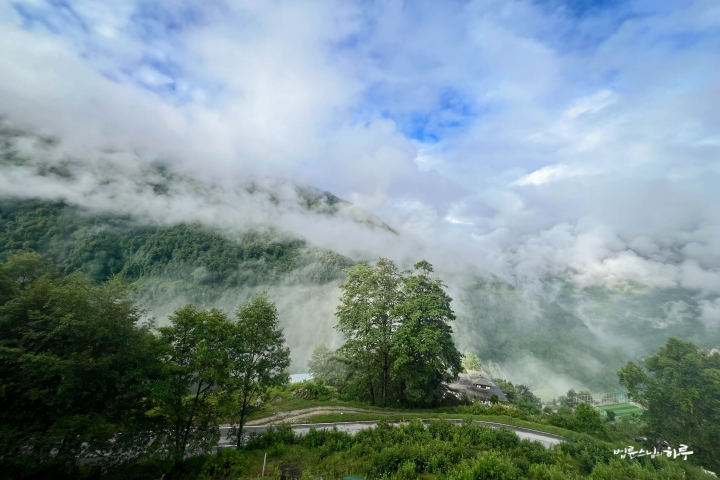
The morning began at the accommodation in Trongsa, located at an altitude of 2,280 meters. Sunim started his day by conducting an online Weekly Dharma Assembly for Jungto Society members worldwide. At 6 AM, he had a simple breakfast of porridge and kimchi prepared by the staff, and at 7 AM, he sat down in front of his laptop.
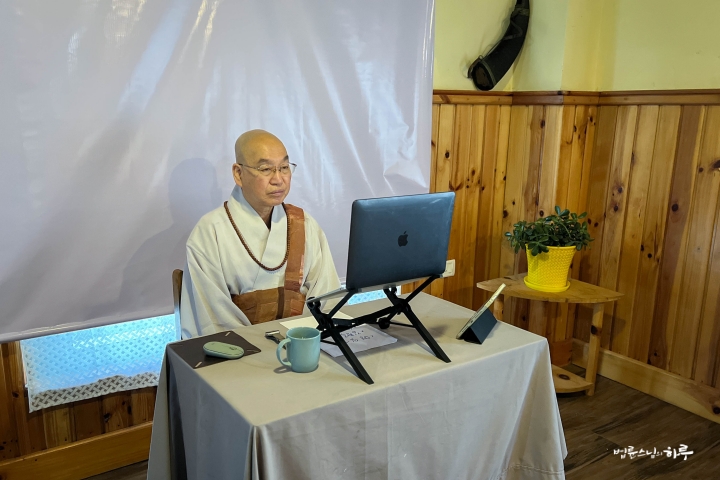
After watching video updates from weekly Jungto practitioners, Jungto Society members requested a dharma talk from Sunim with three prostrations. Sunim shared news of his visit to Bhutan and introduced the work JTS is doing in Bhutan.
“I am currently in Trongsa, a region in central Bhutan. The reason for this visit to Bhutan is to implement a project over the next three years to improve the living conditions of residents across two entire states. We conducted a pilot project over the past year, and for the next three years, we plan to carry out a village development movement to ensure that minimum living standards are possible across both states. We will build houses for those without homes, repair houses with poor interior conditions, and improve or install kitchens and toilets. In areas with water shortages, we will install water supply systems for each village, and in areas with steep slopes that become slippery when it rains, we will build cement stairs. We will create irrigation channels for rice paddies and install fences around fields to prevent animal damage. All of these activities are part of a living improvement movement.
We plan to provide hearing aids for those who have difficulty hearing and dentures for those without teeth. We also planned cataract surgeries for those with poor vision, but since the government already provides a certain level of support and it’s difficult to gather residents who live scattered across the area, we decided to monitor the government’s progress and proceed with cataract surgeries later. Additionally, we plan to partially pave severely damaged road sections so that vehicles can always pass through.
Houses for the Homeless, Hearing Aids for Those Who Cannot Hear
Over the past year, residents have done all the work themselves. JTS only provided necessary materials, and volunteers first demonstrated by building houses and improving interiors as examples, which residents then followed. This time, we will conduct a two-day training program for administrative officials equivalent to village heads, township heads, and county magistrates from the two states. The purpose of this training is to convey JTS’s objective for this project: ‘While improving lives, development must be sustainable.’ To achieve this, development must occur within limits that don’t damage the environment and minimize carbon emissions. At the same time, true self-reliance is only possible when residents can make improvements with their own efforts. Thus, we are carrying out this project with environmental sustainability and self-reliant sustainability as our main goals.
Bhutanese officials mainly want development focused on public facilities like paving roads or building temples. However, JTS’s purpose is to conduct a movement to improve the lives of each poor individual, considering them all to be like Buddha. Officials say, ‘Living improvements are each person’s responsibility, and we must prioritize public interests,’ but the Bhutanese government can handle such matters. JTS aims to do what the Bhutanese government cannot do.
The budget for Bhutan’s sustainable development project is $5 million, approximately 7 billion Korean won – a large scale. After this training ends, we will move to Bhutan’s capital, Thimphu, to meet with the Prime Minister’s Chief Secretary and the Royal Chief Secretary to sign an MOU. Once that happens, the project will officially begin in July. This is why I have visited Bhutan again. Financially, a U.S. foundation that actively supports JTS has agreed to provide substantial funding, so funds are somewhat secured. What remains is how well residents and government officials understand the principles of this project and implement them faithfully. And how well JTS staff support this will be important.”
Following this, people who had registered questions in advance asked Sunim their questions. For one hour, five people pressed the hand-raising button and had conversations with Sunim. One of them asked about interpersonal relationship conflicts at work.
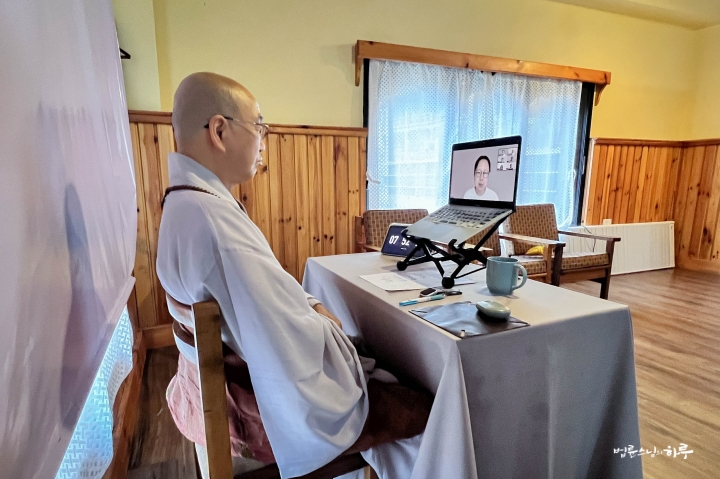
How Should I Handle Workplace Life When I’m Caught Up in Gossip?
“Did you watch the candidates’ speeches during the last presidential election? Candidate A criticized Candidate B, right? They went around criticizing in various places and openly criticized on broadcasts. Candidate B also criticized Candidate A, and another Candidate C did the same. However, Candidate D, who received the fewest votes, hardly criticized other candidates. Like this, you also have several choices. You can gossip about that person, or you can choose not to.
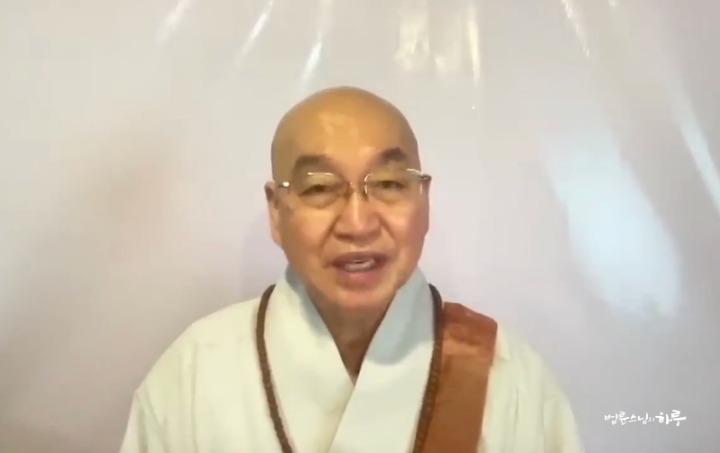
But if a politician says they can’t bear others gossiping about them or that such people should be driven out, then that person shouldn’t be in politics. The same goes for companies. If someone finds it difficult to endure and feels they absolutely cannot work together because someone gossips about them, then that person will have difficulty staying at a company for long and will inevitably find social life itself difficult.
The problem isn’t that person criticizing you; it’s that you still have childish thoughts. You’re excessively clinging to the idea that others shouldn’t criticize you. There are so many people who criticize me too. If I say, ‘The December 3 emergency martial law was wrong,’ conservative people criticize me. If I say, ‘We need to amend the constitution to eliminate the harmful effects of the imperial presidency,’ progressive people criticize me. Even among Jungto Society members, there are those who criticize. They criticize when I say, ‘Let’s support starving people in North Korea,’ and they criticize when I say, ‘Let’s help refugees.’ If I say, ‘Let’s improve relations with Japan,’ they criticize me as pro-Japanese, and conversely, if I say, ‘Japan must reflect on its past,’ the Japanese side criticizes me.
This is how people badmouth and criticize whenever something differs from their thoughts. That’s the world. If you can’t live hearing such words, you have to go into the mountains and live alone. But even if you shave your head, become a monk, and go into the mountains, it’s the same. Even among monks, they always find fault, saying, ‘That person has this problem.’ There’s no world where such things don’t exist at all. If you can’t bear it and keep trying to avoid it, you’ll ultimately have no choice but to make extreme choices. That’s a mental illness. So if you want to badmouth, you can badmouth, and if you think, ‘There’s no need to dirty my mouth too,’ then don’t badmouth. If you’re still angry, whether you badmouth or strongly criticize is your choice. But if even that is difficult to handle, then it’s your own problem. Deciding whether to badmouth and criticize or not is ultimately your responsibility.
Right now, you don’t want to badmouth, but you’re in a situation where you can’t do this or that because it’s painful to hear badmouthing you if you don’t. But actually, listening to other badmouthing you doesn’t require much effort. Only my mouth suffers a little if I try to badmouth. So just think, ‘Your cursing is your business, and I’m comfortable not doing it,’ and go on with your life. What you’re worried about is, ‘If that person goes around criticizing me, won’t my coworkers misunderstand me?’ But you don’t need to worry about that. Such situations aren’t entirely bad. If not just you but others also see that the gossiping person has problems, the more that person criticizes, the less others will believe their words. Maybe one or two out of ten might believe it, but most won’t. Rather, the more severely they badmouth, the more negatively people often view the one doing the badmouthing more negatively. So don’t worry too much about it.
Conversely, if that person’s gossip is quite persuasively accepted by others, your evaluation of that person might have been somewhat off. While I might not trust that person, they might be someone who gives trust in others’ eyes.
No matter how much we badmouth a politician, that politician receives votes because they gain trust from their supporters. In this election too, despite declaring martial law, not properly apologizing, and various controversies, they received 40 percent of the votes. You might think it’s nonsense, but there are people who support them, so what can we do? That’s the world.
If not just you but others also see that person as problematic, there’s no need to respond. It might be unpleasant to hear now, but ultimately, if they continue cursing like that, the one who loses is that person. Think of it that way and keep your mind at ease. If even that is difficult to bear, it might be necessary to get a diagnosis from a psychiatrist.
Ultimately, if you want to badmouth, just do it, and if you think cursing only hurts your mouth, just let it be. If you see that person as someone who doesn’t gain trust from others either, there won’t be any disadvantages coming back to you. How about living a bit more comfortably with that perspective? If you can’t bear it, you need to know that it’s your problem.”
“Seeing Sunim being badmouthed here and there, I thought I should live boldly even if I’m badmouthed. Thank you.”
“There’s a saying that if you do good deeds and get criticized, you’ll live long. If I’ve done something wrong, I can listen to the criticism and reflect, thinking, ‘I was the problem.’ If I haven’t done anything particularly wrong, I can gratefully accept it, thinking, ‘They’re cursing me so I’ll live long.'”
“Thank you. I understand well.”
Questions continued one after another. By the time the dialogue ended, it was 8:30 AM.
After the Weekly Dharma Assembly, Sunim met with the medical officer of the Trongsa region to discuss the denture support project. From 9 a.m., Sunim held a ceremony with the Trongsa Dzongda (District Governor) to deliver 106 hearing aids for residents with hearing difficulties.
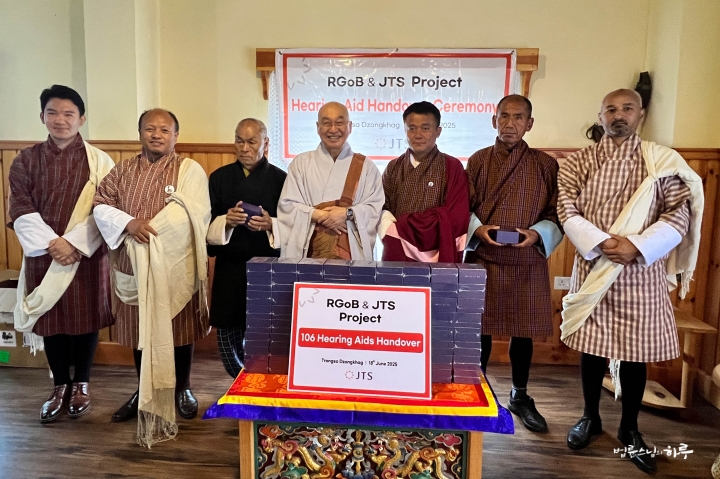
Sunim presented hearing aids to three village residents as representatives.
“Thank you for coming such a long way. When any of the functions of seeing, hearing, or eating becomes impaired, life becomes difficult. That’s why we are promoting projects to improve these three functions: eyes, ears, and teeth. Since the Bhutanese government is already providing separate support for vision improvement, we decided not to be involved in that area. For hearing improvement, while it’s difficult to provide custom-fitted hearing aids, we prepared general hearing aids this time as they can still be helpful. For dentures, we plan to invite specialists from Korea to produce them after consulting with local medical staff.”
After carefully explaining how to use the hearing aids directly to the residents, Sunim asked the medical officer to continuously monitor their usage.
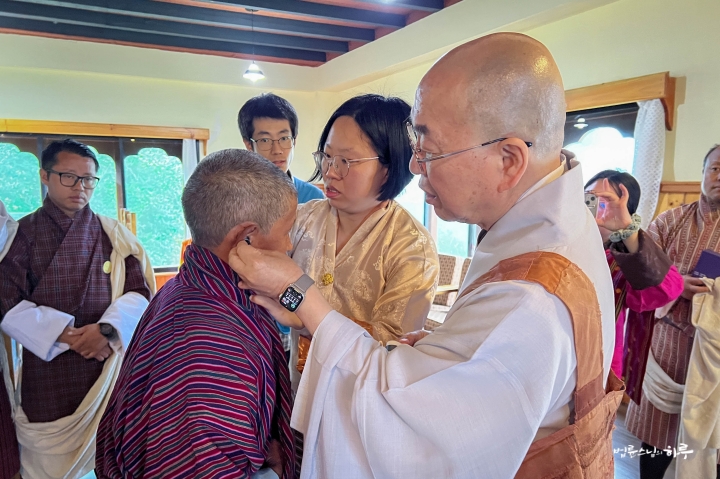
Sunim and the Dzongda then each signed the hearing aid donation certificate.
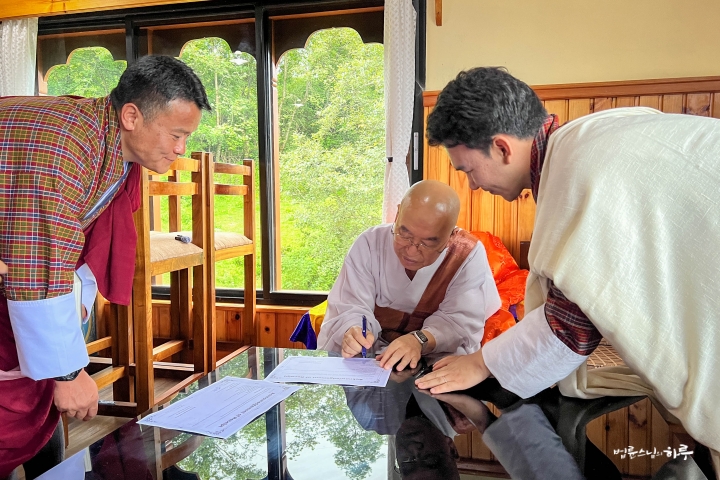
Meanwhile, Gups (Gewog representatives) and Tshogpas (Chiwog representatives) began arriving one by one at the workshop venue to participate in the JTS workshop. Although participants from one Gewog had not arrived, the workshop began on schedule at 10:20 a.m. This workshop was organized to help the Tshogpas and Gups, who are the main implementers of the project, better understand it.
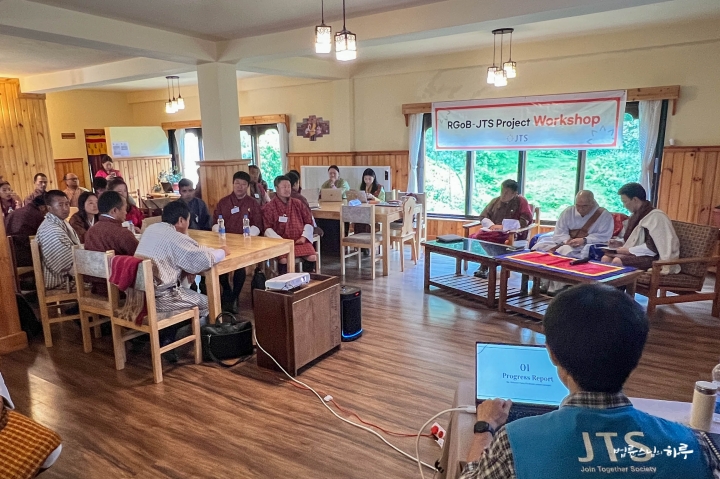
First, volunteer Park Si-hyun opened the workshop by briefly reporting on the progress from Sunim’s first visit to Bhutan in 2023 to the present. It was an opportunity to convey to participants unfamiliar with JTS how JTS began its activities in Bhutan.
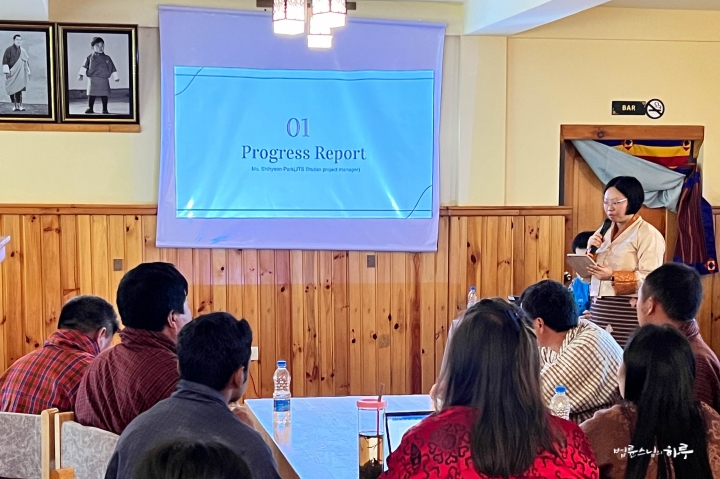
This was followed by Sunim’s opening remarks.
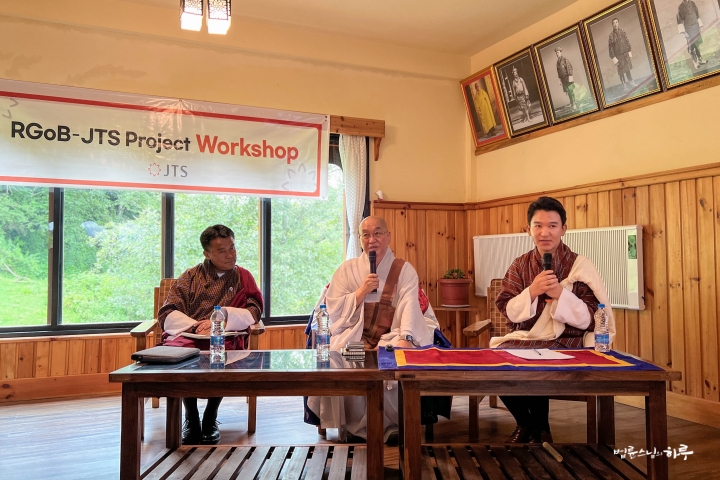
“As you all know well, the Earth is currently facing a serious climate crisis. This crisis stems from consumerism, which believes that producing and consuming more is the path to prosperity. The damage is expected to become even more severe in the future. Yet humanity has not stopped consuming. Although there have been international agreements to reduce carbon dioxide emissions, almost no country is properly adhering to them. To solve the climate crisis, we need to stop or reduce consumption. However, reducing consumption is very difficult in reality. This is because many people still hold the view that ‘we need economic development.’
Since I follow the Buddha’s teachings and value the environment, I have mainly practiced ‘reducing consumption’ and ‘stopping consumption’ in Korea. In other words, I oppose development-centered policies. Of course, poor people must be guaranteed basic living conditions to eat, wear clothes, and have shelter. Please understand that this project is not simply a development project to make you live better, but a poverty alleviation program to help maintain a minimum standard of living.
Minimal Development to Alleviate Discomfort, Not Development for Prosperity
I cannot stop individuals from pursuing development or governments from implementing development policies. However, I do not directly support such policies. Nevertheless, absolute poverty where people cannot even maintain basic living conditions is a problem we must solve together. I emphasize once again that what JTS does is help people who have difficulty with basic living.
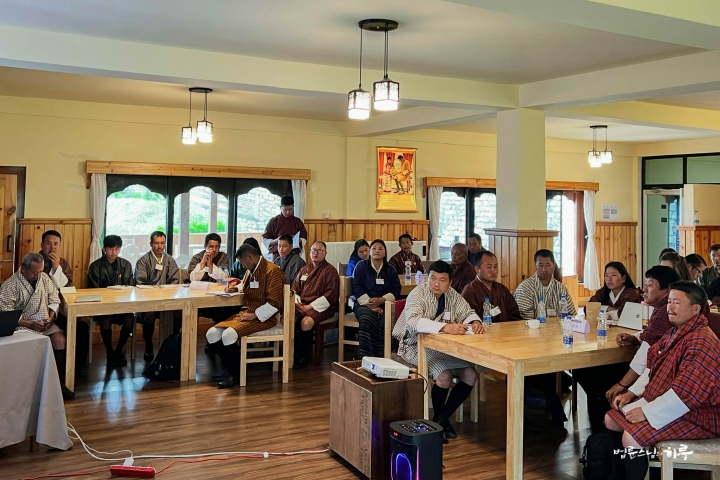
First, people without homes need homes. Second, those who have homes but live in poor conditions need repairs. Kitchens and toilets especially must be improved, and drinking water must be supplied sufficiently for daily needs. Third, most village paths have steep slopes and become very slippery and dangerous when it rains. Some sections need to be paved so residents can walk safely. Building and paving roads is originally the government’s job, but construction is often delayed due to budget constraints. In such cases, JTS can support road paving only in dangerous areas like sections with water flow or steep slopes. Fourth, irrigation channels are needed for rice farming. Water is necessary for farming. Fifth, fencing is needed for dry field farming due to frequent damage from wild animals. Sixth, since there are many elderly people in rural areas, we need to alleviate their living difficulties. We plan to provide medical support for those who have difficulty seeing, hearing, or have dental problems. Seventh, some school facilities also need repairs and improvements. Eighth, as internationalization progresses, traditional culture is gradually disappearing. We also plan to work on preserving the unique traditional culture of each region.
Thus, what JTS and you want to do first focuses on reducing daily inconveniences and improving living conditions rather than increasing income. Even if living in rural areas, people should escape absolute poverty and have at least minimum living conditions.
However, this is not something JTS does for you. JTS only provides materials; you must repair your own homes, and when you cannot do it alone, neighbors must help together. JTS will support you so that the community can solve problems on its own. So this project is not a large-scale development project or public project as you might expect. Please understand it as work to gradually improve daily inconveniences.
Let’s Work Together So No One Around Us Is in Absolute Poverty
The original plan was to start the project centered on Zhemgang, the area with the highest poverty rate in Bhutan. Even if we expanded the scope, we planned to include only Korphu Gewog near Zhemgang. However, the Dzongda requested that we look around the entire Trongsa Dzongkhag while we were at it. That’s how the entire Trongsa Dzongkhag came to be included in the project scope. In fact, Trongsa Dzongkhag is an area where poverty alleviation has been achieved to some extent, so it’s not perfectly suitable for this project. However, since circumstances differ by region, we will expand the target areas if deemed necessary after directly examining the sites.
Participating in this work will not increase your salary. Please join us with a spirit of service for the residents. JTS is an organization composed entirely of volunteers, and not a single person receives a salary. The young people dispatched here are all volunteers too. Therefore, it’s difficult for one person to stay here for a long period, and there’s also the disadvantage that the staff in charge changes frequently. Please understand this in advance.
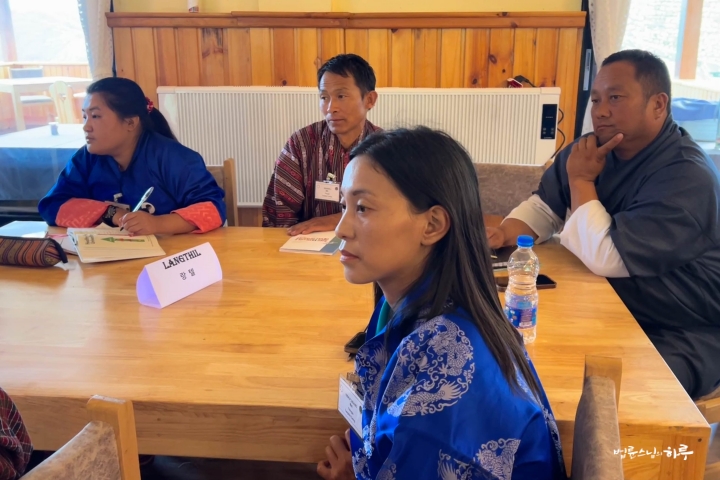
The success or failure of this project depends entirely on you. The purpose of this project is to work together so that at least no one around us is in absolute poverty. This is not about doing the government’s job for them. It’s about finding blind spots that the government cannot reach and promoting practical improvements in residents’ lives. If we truly want to help our neighbors in need with all our hearts, I believe we can accomplish anything. Please keep in mind that this is a private project, not a government project, and I hope you will sincerely join us.”
This was followed by welcoming remarks from the Trongsa Dzongda.
“This project may seem small now, but looking at the big picture, it’s the beginning of a major change. Its success depends on all of you here – the administrators and local leaders. As civil servants receive salaries from residents’ taxes, we must work with a sense of responsibility for the residents. All JTS members are working as volunteers. Since we receive compensation for our work, we must approach this with even greater responsibility and sincerity.”
From 11 a.m., there was time for participant introductions. As participants from each Gewog finished their introductions, Sunim greeted them saying “Nice to meet you.”
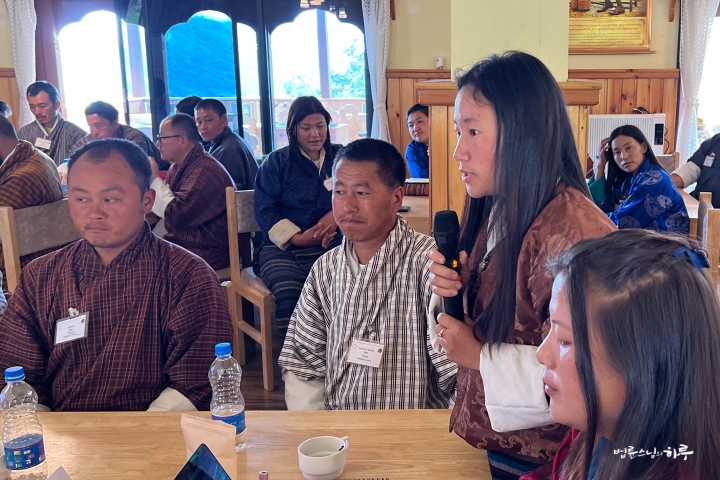
Next, volunteer Park Si-hyun introduced JTS’s international activities. She explained what activities JTS conducts in which countries, focusing on the core values of the activities.
From 11:30 a.m., Sunim explained the purpose and direction of this project.
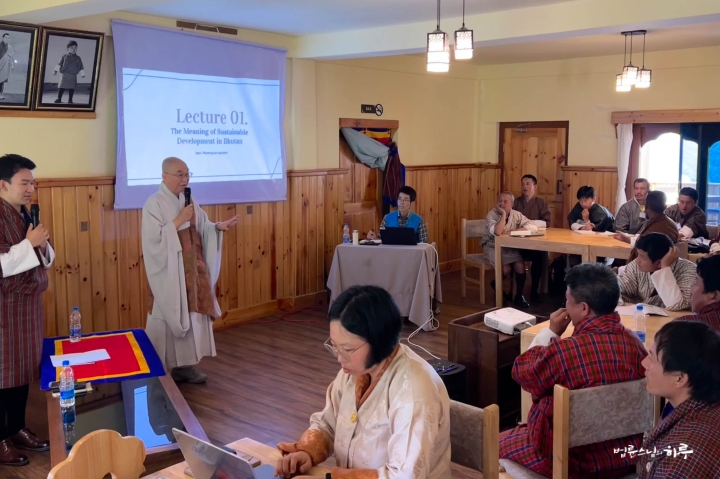
“The purpose of this project is for us to work together to renovate our villages. Korea was also very poor just 60 years ago when I was in elementary school. In 1960, the per capita GDP was only about $100. After Japanese colonial rule, immediately after liberation, Korea suffered the Korean War and extreme poverty.
In just 60 years, Korean society has changed remarkably. This change was not just due to government policies. Even during times of poverty, people who received school education returned to their hometowns to teach uneducated children, and those who earned money outside provided construction materials like cement to their home villages. Villagers worked together to repair houses and maintain roads. There was a spirit of wanting to develop villages on their own. That was the ‘Saemaul Movement’ (New Village Movement). The song we sang in those days was ‘Let’s live well, let’s live well. Let’s live well for once!’ The lyrics contained the desperate desire asking why we must always live in poverty. The movement that began this way became the foundation for building today’s Republic of Korea. Therefore, we should not just look at the results but also see the spirit embedded in the process. Just 50 years ago, Korea was a much more difficult country than Bhutan.
Let’s Change Our Own Neighborhoods
While the projects promoted by the Bhutanese royal family and government are certainly important, I think what’s more crucial is the voluntary participation of residents. For this movement to work properly, the awareness of government officials must change first. Although this project has the character of a civilian movement, NGOs alone are not sufficient, and cooperation with local officials is absolutely necessary. So this project is neither purely an NGO activity nor a typical government project. Looking at the budget structure, it’s closer to a private project, but in actual implementation, it’s desirable for government officials like Gups or Tshogpas to be at the center, working together with residents.
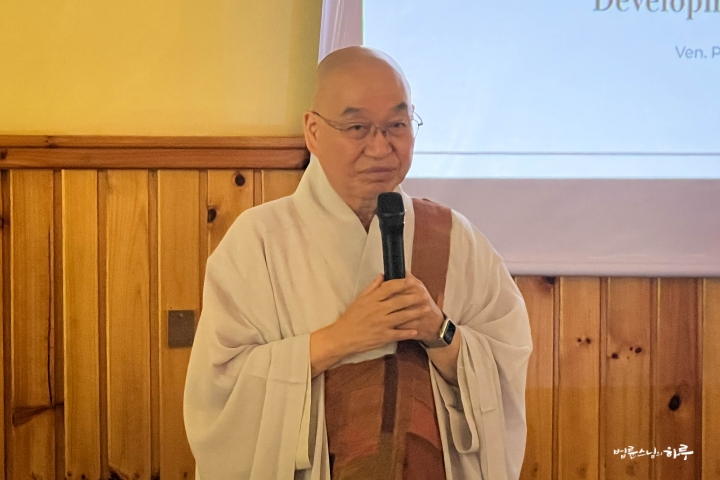
Since Bhutan has had no experience with this type of project, the government initially proposed, ‘If you give us the funding, the government will carry out the project.’ However, after I personally toured the villages and checked, I found that in government-led projects, residents only made demands saying ‘please do this for us’ but lacked a cooperative attitude. But when it became known that this project was being helped by a Lama, the situation changed. Everyone came forward saying, ‘Even relatives don’t help us, but a Lama from a distant country is helping us, shouldn’t we also work hard?’
The goal of this project is for village residents to develop their own villages into prosperous places. But if I just encourage them with words without giving anything, residents won’t follow. So I said that if residents say ‘we can do it,’ JTS will support whatever it is. What’s more important than the achievement of building a house or paving a road is the fact that residents directly participated in the entire process. However, since Tshogpas and Gups are elected by residents, it might be delicate to propose doing something to residents. This is because they gain popularity by just giving things away. When officials suggest working together, some residents misunderstand, saying ‘didn’t you embezzle the support funds?’ To clear up such misunderstandings, I personally visited each village. I explained, ‘We will support as much as you do.’
While resident participation is important, residents cannot take on the task of planning projects. That role must be centered on administrative officials like Gups and Tshogpas. Therefore, it’s most important that you deeply understand the purpose of this project. Many young people in Bhutan want to go abroad to earn money, and families expect a more comfortable life by building houses in the countryside with money their children send. However, our neighborhood is where we live, so we must build it with our own hands. If you just provide a little administrative direction, residents can do well enough. You must create projects by working directly on-site together, not just giving instructions.
This Is Not the Lama’s Work but Our Work
The primary goal of this project is poverty alleviation. Once this is achieved to some extent, the secondary goal is to find ways to increase income. People who already have basic living conditions are not direct targets of this project. However, that doesn’t mean you should take the position that ‘I have nothing to do with this project.’ You must have an attitude of helping neighbors in need and solving problems together. Those who can do things themselves with just materials provided should do so on their own, and in cases where it’s difficult to do alone due to old age or disability, the village community must work together to help. The goal of this project is to practically improve the lives of poor individuals.
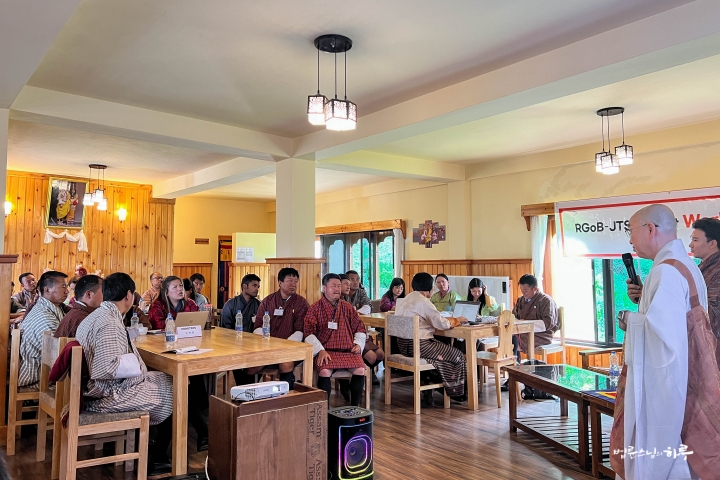
While the government can build public facilities and roads, it’s difficult to take detailed care of individuals’ daily lives. However, what Bhutan as a nation aims for is that every Bhutanese citizen should have their own home and be able to live comfortably. That’s exactly what we’re trying to do. Do you understand?”
“YES!”
“Doing this work won’t give you additional salary. However, since you already receive salaries and can maintain a minimum standard of living, we’re asking you to work together for the poor neighbors in our villages. This is not the Lama’s work but your own work. I ask you to actively make plans with the mindset that ‘this is my work.”
After lunch at noon, they watched videos of JTS activities conducted in India, the Philippines, Afghanistan, and other countries. The participants watched the videos with high interest and concentration.
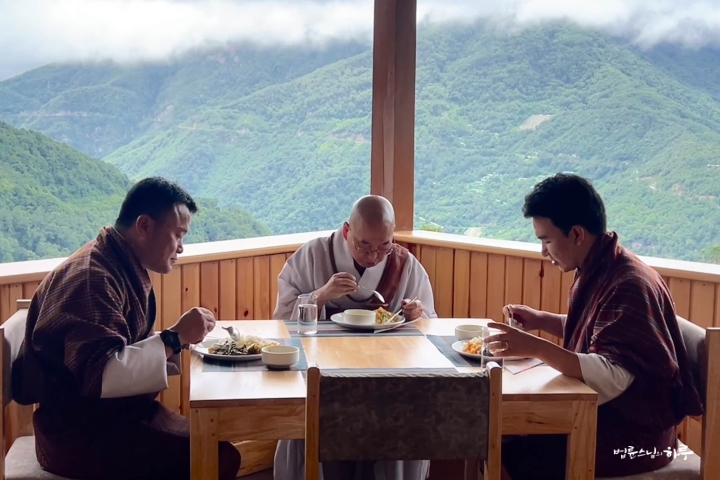
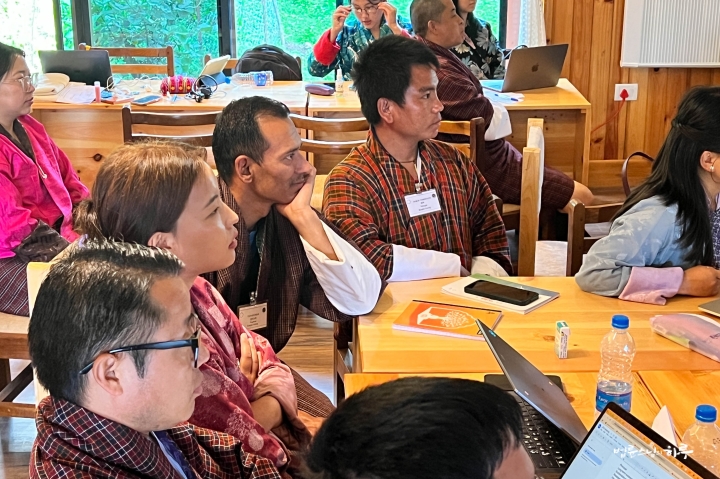
From 1:40 PM, the planning officer introduced the content and results of the pilot project conducted last May, and participants watched related videos together. Following this, activist Park Si-hyeon presented the implementation plan for the main project starting in June, and the Dzongkhag accounting officer and procurement officer explained the accounting procedures and funding methods for the main project. Sunim listened to the content through Rinchen’s interpretation.
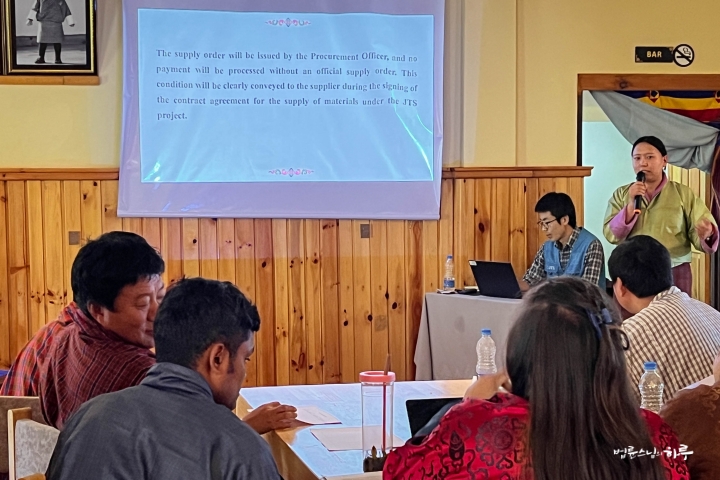
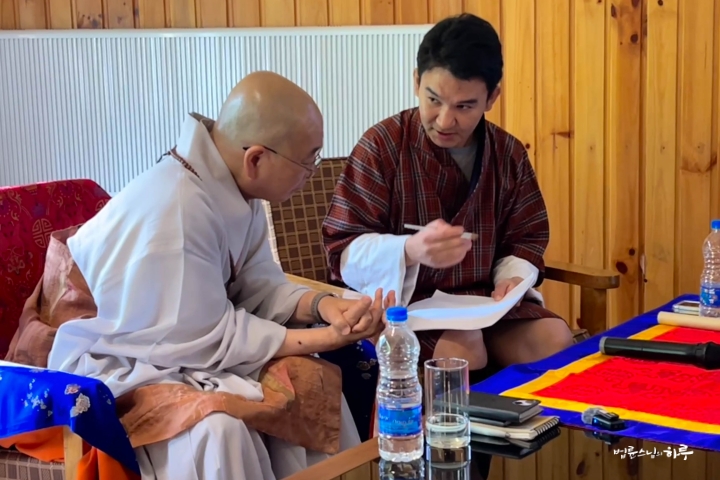
From 2:30 PM, participants gathered by gewog for group discussions to develop implementation plans for the main project starting in June. Before the discussion, Sunim requested that the tshogpas from villages that had conducted pilot projects share their experiences.
“If you faced any difficulties while conducting the pilot project, it would be good to share them together.”
In response, tshogpas from Korphu, Nimshong, and Nabji villages raised their hands and shared their experiences.
“The road work was relatively easy because the villagers helped together. However, building houses for poor households was difficult because we were building houses for individuals, so cooperation was not good.” “For the irrigation channel construction, transporting materials was really hard. Without farm roads, it’s difficult even to transport materials.”
After listening carefully to the tshogpas’ stories, Sunim pointed out common points to consider when making plans.
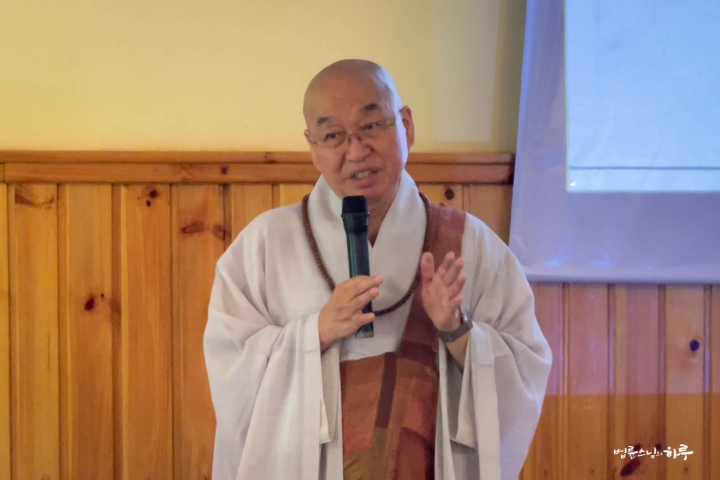
“House construction must be done during the dry season or agricultural off-season. When it rains, it’s difficult to transport materials, and during farming season, there’s a shortage of workers. Although building a house is an individual matter, it requires the village’s collective help, so timing must be chosen carefully. The same applies to irrigation channel construction. Since transporting materials is the biggest burden, it’s better to first build farm roads to secure paths for material transport before constructing irrigation channels.”
Subsequently, from 2:40 PM, full-scale group discussions began by gewog. Gups and tshogpas planned various projects considering their village situations, including new house construction, road and sidewalk repairs, water source reinforcement, and fence installation. They specifically coordinated not only project priorities but also material procurement methods and work timing.
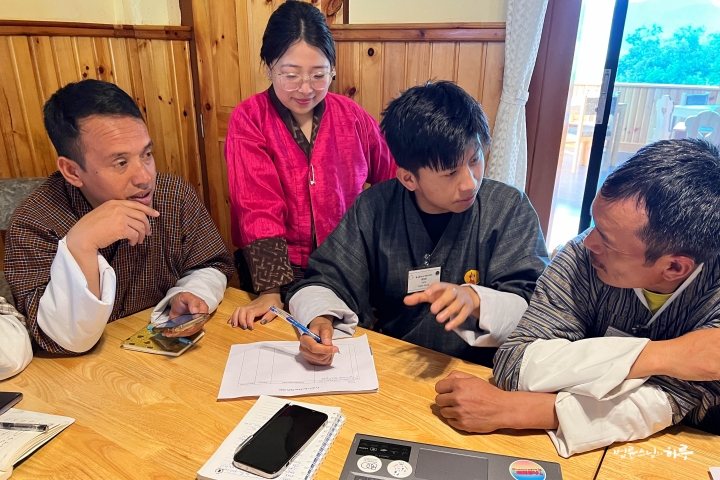
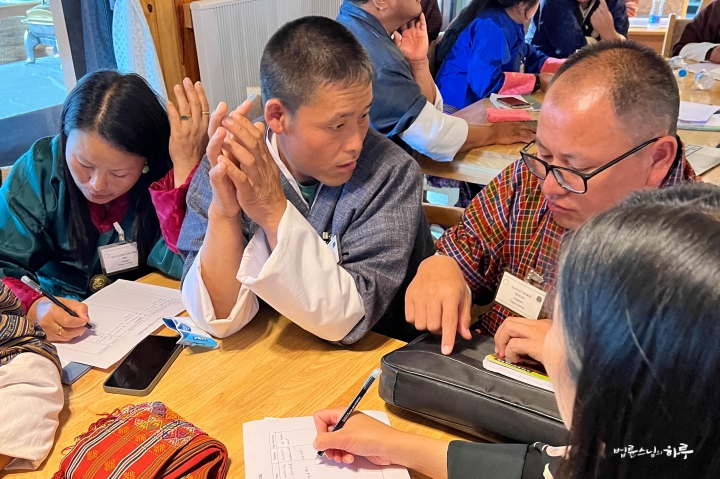
After completing the discussions, from 4:20 PM, each gewog presented their 2025 village project plans.
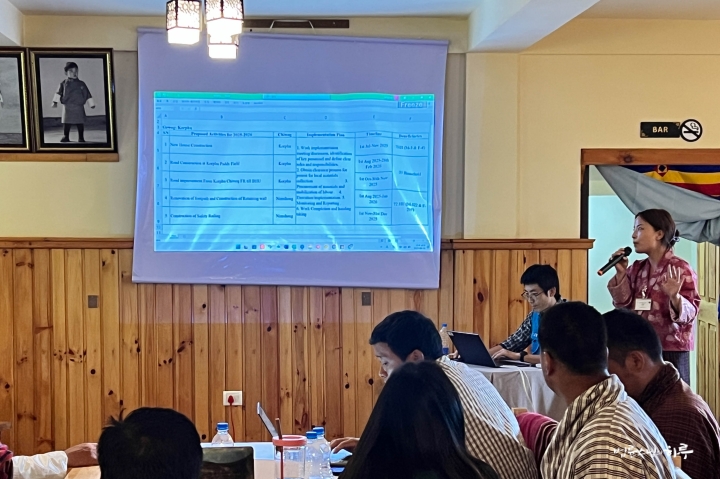
Korphu Gewog had conducted various pilot projects over the past year, including irrigation channels and road paving, but their 2025 plan was relatively modest compared to the village’s current issues. After listening to all the presentations, Sunim said with a smile.
“It seems Korphu Gewog is a bit tired after working hard for a year? (laughter) It’s okay if you can’t do everything this year. Since this project runs for three years, you can proceed step by step without overexerting yourselves.”
Sunim listened carefully to each gewog’s presentation and provided advice on specific points where plans were excessive or didn’t match reality, helping them make adjustments.
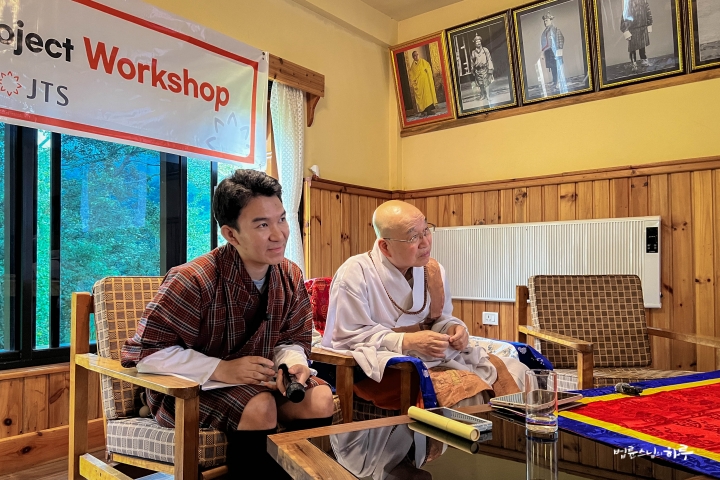
Bemji-Chela Chiwog presented plans to build 40 meters of retaining wall and repair roads. Regarding this, Sunim suggested, “Isn’t building 40 meters of retaining wall too overwhelming for the residents to handle?” and proposed readjusting the plan considering the residents’ actual labor capacity.
Gagal-Kalshong Chiwog announced they wanted to conduct poverty-related projects next year in addition to road repairs. Regarding this, Sunim emphasized, “You must definitely check whether there are households classified as poor in the village. During these three years, we must ensure that no families are classified as poor due to lack of housing or water.” stressing that one of the core objectives of the entire project is to reduce poor households.
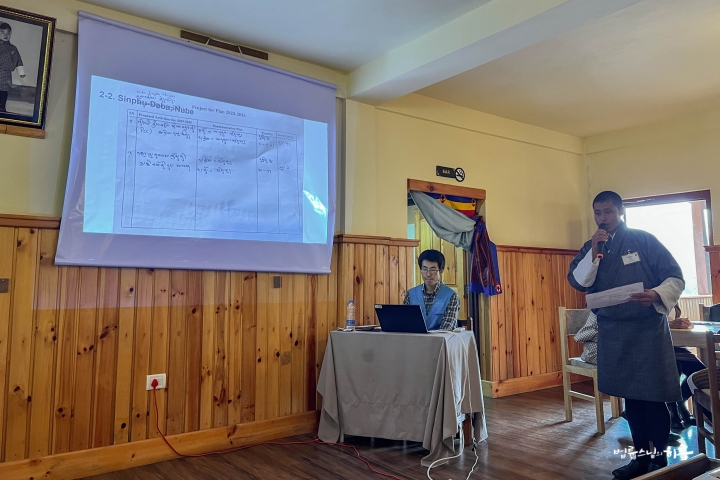
Phomjur Chiwog and Wangling Chiwog, areas with poor living conditions and many homeless families, presented plans to build new houses and repair existing homes. Regarding this, Sunim emphasized,“Building new houses and making repairs must be done, even if not this year. These areas are particularly difficult, so they should be prioritized”.
Dangdung Chiwog presented a plan to build four new houses in one year. Regarding this, Sunim suggested, “Building all four houses in one year might be too much. Wouldn’t it be better to spread it over two years?” proposing a more manageable implementation approach.
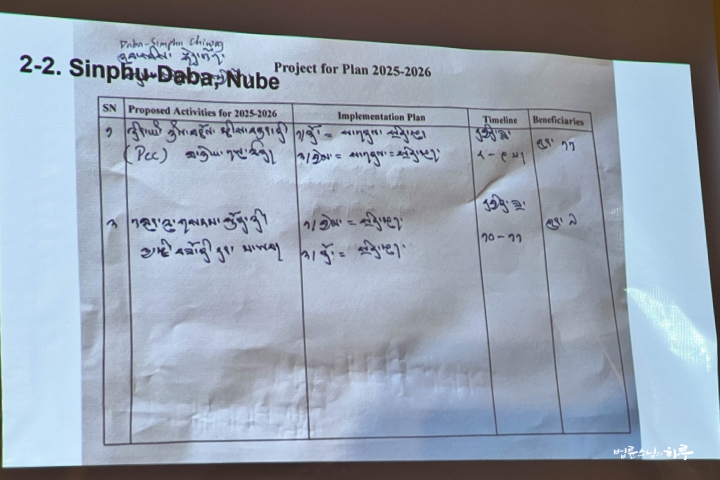
Many villages requested fencing due to severe crop damage from animal intrusions. Using fence installation as an example, Sunim explained JTS’s principles for sustainable development projects.
“Steel pipe fencing would be best, but it’s too expensive. Moreover, those materials aren’t even produced in Bhutan. So for now, we’ll decide to make fences with wooden posts. We’ll implement it first and make gradual improvements.
The most common animals appearing here are wild boars and deer. Since wild boars mainly dig underground, the bottom of the fence must be made flat. When I personally inspected the sites, I saw that usually about four lines of barbed wire were installed. That’s why wild boars were digging through the gaps. So this time, how about increasing the barbed wire to about seven lines? Instead of using steel pipes, we’ll reduce costs by using wood, but compensate by increasing the number of barbed wire lines. Especially the bottom line should be installed slightly buried in the soil to prevent wild boars from digging underneath. However, since deer jump over the top, we need to add rounded wire mesh on top as well. Deer typically jump about 2 meters high. Meanwhile, there’s no proper way to block monkeys.
Animals don’t enter just anywhere; they have their own paths. Just like you have regular paths except when in a hurry. So areas that are frequently breached need to be reinforced more densely. If they can’t break through their usual paths, they’ll try the sides. So if you block just one or two more spots nearby, they won’t enter anymore.
Fence Installation Method That Reduces Costs and Increases Effectiveness
Wooden posts rot after about 3 years. However, there’s a method that doesn’t require replacing posts. Among trees, there are some that survive even when cut and planted during the rainy season like now. Plant about 3 of these trees between the barbed wire. Then these trees will grow along the barbed wire. Later, even when the original posts rot, these trees will replace them. However, these trees need to be pruned at the top every year.
Try it once first, and if it’s effective, it would be good to continue this way. However, when barbed wire is distributed, some people don’t install all seven lines at once but only install four lines and store the rest in warehouses. When I visited youth farms that received government project support, they had roughly installed wire mesh on only half and stored the rest in warehouses. So after you complete this work, you must check the results.”
After listening to the presentations from the four gewogs and exchanging opinions, the discussion session ended at 6 PM. Participants who had intensely brainstormed together took a brief rest before having dinner together at 6:30 PM. After finishing the meal, a cultural performance began at 7:10 PM. Participants presented traditional songs and dances to Sunim. Though not elaborate, it was a stage full of sincerity.
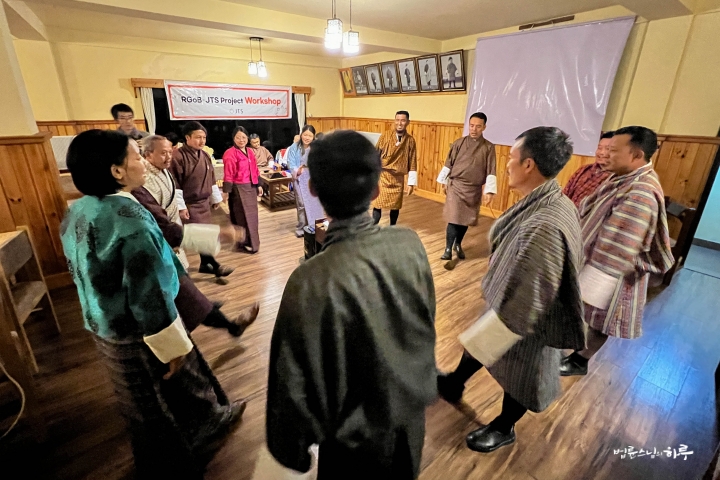
After completing the cultural performance, Sunim worked on manuscript editing and various other tasks before retiring for the night.
Tomorrow, after conducting the second day of the JTS workshop program in Trongsa, the group will move to Zhemgang.





